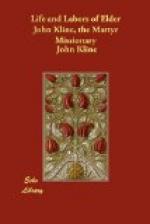WEDNESDAY, August 24. Went to Benjamin Bowman’s and back home. We have had a wonderful rain to-day. Waters higher than they have been for twenty-eight years.
SUNDAY, September 4. Meeting in our meetinghouse. Romans 6 was read. John Miller and Abraham Deitrich’s wife were baptized by Benjamin Bowman.
THURSDAY, September 8. Anna [Brother Kline’s wife] and I go to Lost River to attend a love feast. We stay all night at Celestine Whitmore’s.
SUNDAY, September 11. Meeting and love feast at Mathias’s. Hebrews 8 is read. We have a delightful day and night, and many people are assembled. I speak on the chapter read, and also upon the general scope and design of the epistle to the Hebrews. Hebrews, and Jews, and Israelites are all one; each being only a different name for the same race of people. The name Hebrew and Hebrews appears to have been derived from Eber or Heber, the grandson of Shem. The name Jew and Jews is supposed to have been derived from Judah, one of the sons of Jacob. The name Israelite and Israelites was derived from Jacob, whom the angel of the Lord called Israel.
This epistle was written to the Hebrews, or Jewish Christians, to remove from their minds some difficulties and obscurities in their way of rightly understanding the way of salvation provided by our Lord Jesus Christ. On account of their former connection with the ceremonial law and the Mosaic ritual, it was hard for them to see and appreciate the simplicity that is in Christ. Like Naaman the Syrian, they thought the ceremonial part should possess more parade and show, to have in it the required virtue. He thought that bathing his body seven times in the river Jordan was a ceremony too simple to remove his leprosy: so these Hebrew Christians thought the simple ordinances of the house of God were too insignificant to take away their sins. They had been instructed in the ordinances of a worldly sanctuary and a worldly priesthood. As Christ had abolished all these, by giving to the church the spiritual substance of which these were the shadow, it was necessary that they be very particularly and plainly taught how this was done. The writer of this epistle has shown this in very clear light.
The chapter read speaks of the True Tabernacle, which the Lord pitched, and not man. It presents Jesus as the Mediator of a better covenant, which has been established upon better promises. This is the covenant: “I will put my laws into their mind, and on their heart also will I write them: I will be to them a God; and they shall be to me a people. For I will be merciful to their unrighteousness, and their sins and their iniquities will I remember no more.” These are cheering words: “Their sins will I remember no more.” Beloved brethren and sisters, this is precisely the way God deals with every one of his truly penitent and obedient children. He remembers their sins no more. No matter how great sinners they have been, no matter how they have abused and dishonored him, he holds nothing against them. In this we may see the spirit we should all possess. We are all commanded to be followers of God, as dear children, and walk in love.




